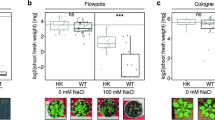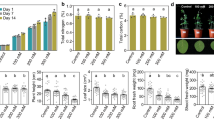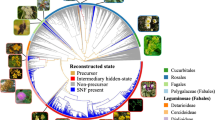Abstract
LITTLE research has been conducted into the nutrition of hemiparasitic plants since the early part of this century. These plants, predominantly confined to the sub-family Rhinanthoideae of the Scrophulariaceae, become parasitic by establishing root connexions with the host plant through haustoria.
This is a preview of subscription content, access via your institution
Access options
Subscribe to this journal
Receive 51 print issues and online access
$199.00 per year
only $3.90 per issue
Buy this article
- Purchase on Springer Link
- Instant access to full article PDF
Prices may be subject to local taxes which are calculated during checkout
Similar content being viewed by others
References
Koch, L., Jahrb. f. wiss. Bot., 20, 33 (1889).
Ewart, A. J., J. Linn. Soc. Bot., 31, 364 (1895).
Kostytschew, S., Beihefte z. Bot. Centrlblatt., 40, 351 (1923).
Heinricher, E., Ber d. deutsch. Bot. Ges., 42, 243 (1924).
Bonnier, G., Bull. de la Soc. de Biol., 651 (1889); C.R. Soc. Biol., 113, 1074 (1891); Bull. scient. du Nord de la France et de la Belgique, 25, 77(1893).
Rogers, W. E., and Nelson, R. R., Phytopathology, 52, 1064 (1962).
Author information
Authors and Affiliations
Rights and permissions
About this article
Cite this article
GOVIER, R., HARPER, J. Angiospermous Hemiparasites. Nature 205, 722–723 (1965). https://doi.org/10.1038/205722a0
Published:
Issue Date:
DOI: https://doi.org/10.1038/205722a0
This article is cited by
-
Context-dependent outcomes in plant–plant interaction: impacts of abiotic factors and host plant on a hemiparasitic plant performance
Plant Ecology (2023)
-
Effects of herbivory and mistletoe infection by Psittacanthus calyculatus on nutritional quality and chemical defense of Quercus deserticola along Mexican forest fragments
Plant Ecology (2017)
-
Like herbivores, parasitic plants are limited by host nitrogen content
Plant Ecology (2008)
-
Hemiparasitic Flowering Plants: Phenotypic Canalization by Hosts
Nature (1970)
Comments
By submitting a comment you agree to abide by our Terms and Community Guidelines. If you find something abusive or that does not comply with our terms or guidelines please flag it as inappropriate.



